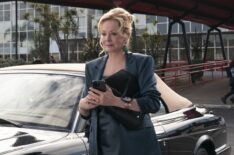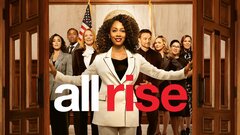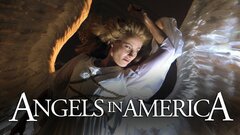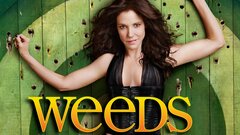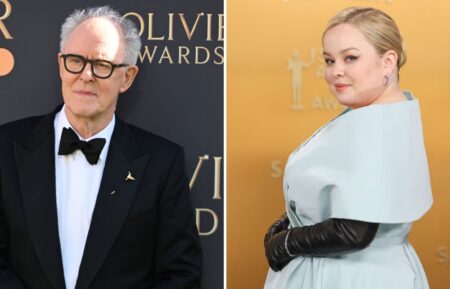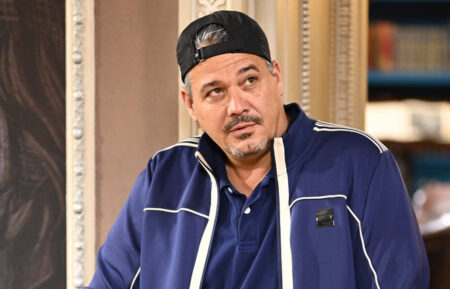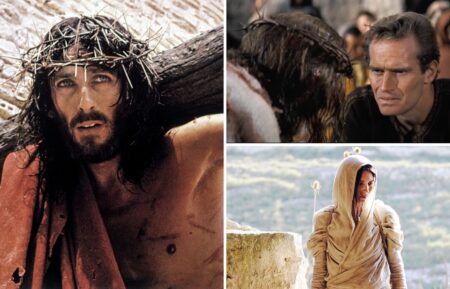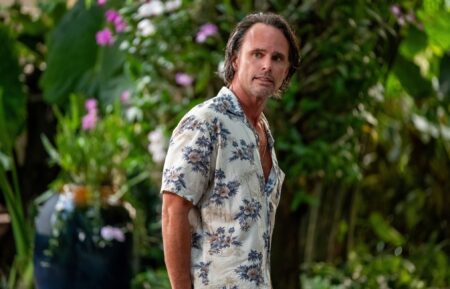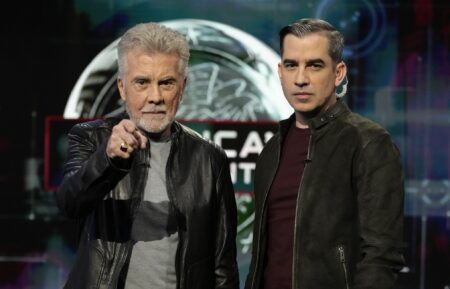Mary-Louise Parker Talks ‘The Gray House’ & Reflects on Her Most Impactful Roles
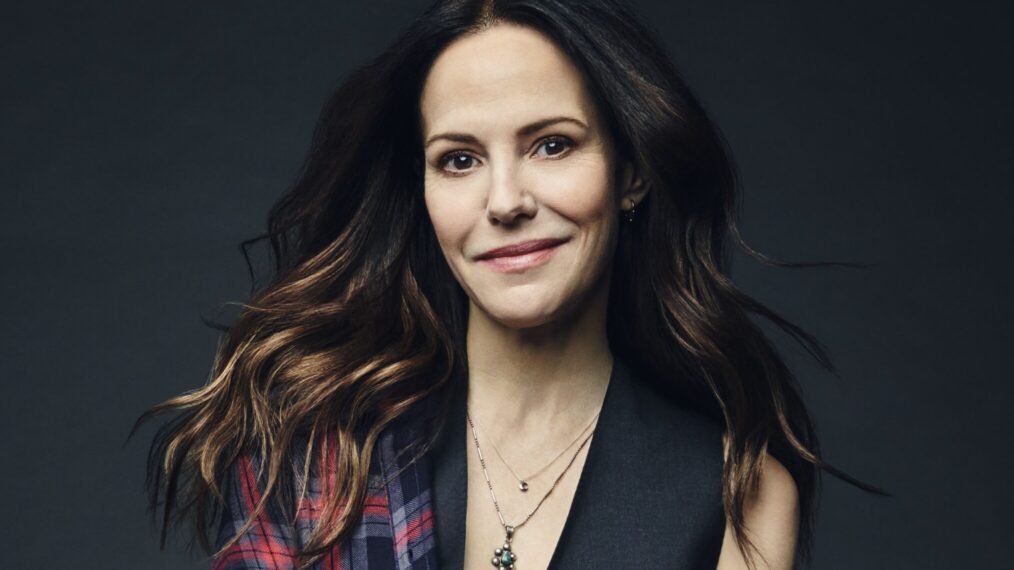
Q&A
Mary-Louise Parker never shied away from a challenging part. It’s this fearlessness that has translated into success in movies, television, and the Broadway stage. The actress, known for everything from Fried Green Tomatoes and Angels in America to The West Wing, and Weeds, continues to find work she is passionate about. The latest is the upcoming limited series The Gray House.
Told across eight episodes, it’s a historical true story centering on unsung women who turned the tide of the American Civil War in favor of the North. A Virginia socialite, her mother, and formerly enslaved sister-in-arms are among those who come together and risk their lives building an underground spy network for the greater good. They ultimately helped turn the tide against the Confederacy. Amethyst Davis, Daisy Head, and Ben Vereen are also part of the ensemble cast. The project comes with several heavy hitters including Kevin Costner’s Territory Pictures and Morgan Freeman and Lori McCreary’s Revelations Entertainment alongside Leslie Greif’s Big Dreams Entertainment. It is a Republic Pictures title being distributed by Paramount Global Content Distribution.
Attendees of the 63rd Monte Carlo Television Festival, which runs from June 14-18, are going to be the first to see it. The premiere is one of the highlights of this year’s festivities, which celebrates the best in entertainment on an international scale. Ahead of the festival, Parker opens up about the making of The Gray House and reflects on some of her most impactful roles.
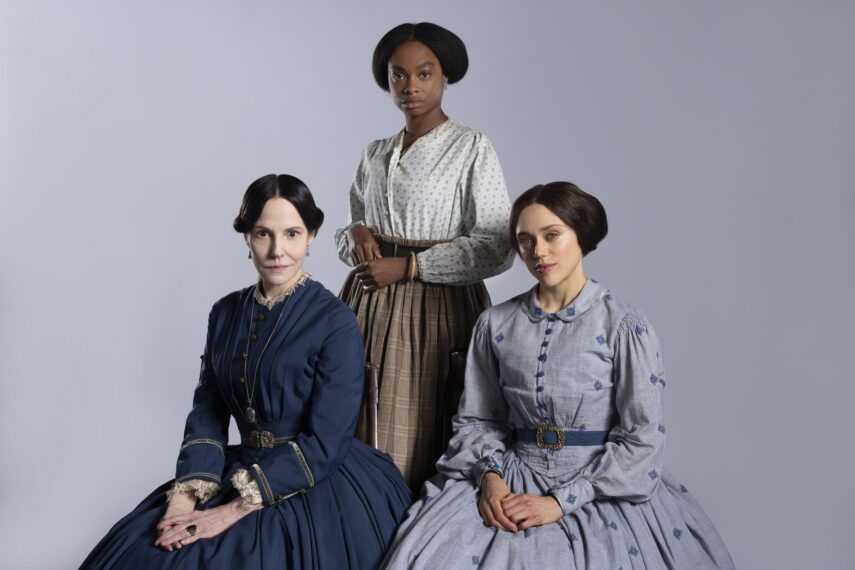
Mary-Louise Parker, Daisy Head, and Amethyst Davis in The Gray House
Have you attended the Monte Carlo Television Festival before?
Mary-Louise Parker: I have been to Monte Carlo, but not to the festival. It has been years. My son is coming. He had a small part in the TV show. It will be fun to do that with him. I haven’t been to that place since I was 17, so it will be fun seeing it from completely different eyes. It’s kind of funny because the environment for shooting given the subject matter of The Gray House was really unglamorous, so to have it premiere somewhere glamorous is kind of ironic.
I’m always excited to get to see filmmaking from other places. It’s usually the stuff I respond to the most. I think that has made it easier to access some of these projects we see. I do have to say I have a soft spot for going to the old movie art house movie theater in New York. It is nice to have access though to all this wonderful filmmaking that would be otherwise hard to see.
Morgan Freeman will be honored with the Crystal Nymph Award. He is one of the producers of The Gray House. Having worked with him in the past on Red, too, how has it been getting to know him? What is it like for you to see him honored for his body of work?
I think it’s wonderful for anyone who knows him or who has worked with him. He is one-of-a-kind. I remember the first time I met him I was on an elevator, and he was singing “The Girl From Ipanema.” It was so charming to me. He carries that gravitas that everyone knows because he is Morgan Freeman. He also has a lightness too. I like to see someone who has been working that long get some recognition. Someone who deserves it. An actor’s actor.
The Gray House is this limited series that shines a light on a story not widely known. What was your first impression when you were reading the script?
On the one hand, I was really surprised. I thought it was an amazing story I’d never heard of. First of all, it’s incredibly cinematic, so I was surprised nobody had made it before. It’s just such a great story. I was shocked that we never had been told this story. It was nice that it’s about women, younger women in particular. All the young women are just incredible. I was impressed with all of them.
Tell me about your role Eliza Van Lew.
I feel like it revolves around Daisy and Amethyst’s character. I like my relationship with them. I like how she learned from the younger girls and how part of her is stuck in the past a little bit. She is not a perfect person. She does these heroic things, but within there is this conditioning that is unfortunate. Something a lot of people grow up with. This tragic misunderstanding of what is right and the stain on American history. I liked watching her, an unlikely person and hero. I loved how she learned so much from her daughter and Amethyst’s character. Her admiration for them is really moving. Those actresses were just spectacular.
How was it having your son on set?
Great. He was wonderful. There were so many wonderful actors in this. I was really impressed with them. They weren’t hanging on their phones. They were all prepared and serious about it. It wasn’t an easy shoot. I was really impressed with all of them. I didn’t feel like I was hanging around with young people waiting to get famous. I felt like these people were taking this job so seriously and really ready to work.
Does taking this mentor role at this stage of your career get you thinking about when you were breaking into the industry?
I’ve always kind of done that. I work with a lot of kids and coach them to get into school. I had an acting camp for five years in my house. It’s something I really love. In some ways, I love it more than acting myself. It feels really satisfying to watch someone else succeed and surprise themselves. Find those first few times they take off and feel that lightness that inspiration can bring. It’s really satisfying for me. It’s not as heavy as my own process. It feels more gratifying. I like being the older lady, honestly.
This year marks the 20th anniversary when Angels In America swept every major category at the Emmys Awards. How do you look back on the role and experience?
Oh my God! 20 years! I didn’t realize that until you said it. That’s amazing. I guess that’s true because my son is 20. Wow. It’s just one of those jobs I can’t believe I got. I just couldn’t believe my luck it was that part, and I got to say those words. I will be forever grateful Mike [Nichols] gave me that chance. That I got to have that time with him. We went on to have a deep friendship, so I was blessed in a bazillion ways by that project.
Here we are in Pride Month, given your history with projects like When We Rise, how important is it to have these stories told now more than ever?
I believe I was in one of the first movies that depicted homosexuality and had those storylines with Longtime Companion. Sometimes people forget about that movie, but that was probably one of the first AIDS movies I can remember. I took that part without reading the script. I just wanted to be a part of it. This was the 1980s, and I lost a lot of people. I think those stories were underrepresented.
There were Fried Green Tomatoes too, which wasn’t explicit, but little steps forward. That has always been important to me. I don’t consider myself super political or anything, but important projects are something I’ve always gravitated towards. I’ve been proud to be in those, especially Longtime Companion because it was the first. I had friends who were not happy about it. They weren’t my friends anymore. It was a time when it was okay to say that was shocking. It was okay to say you were displeased to see that, which thankfully we’re hopefully moving away from that. We have ways to go, but still.
Every bit forward is a bit forward.
Absolutely.
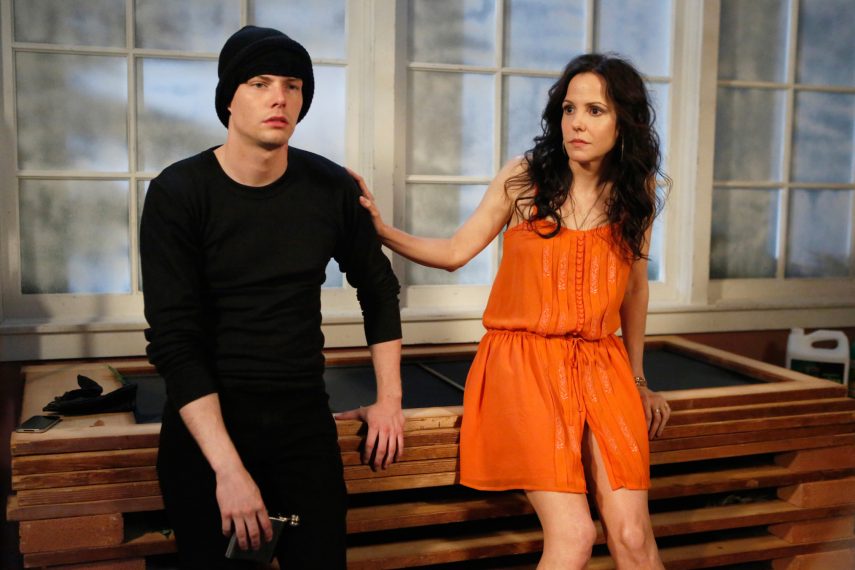
Hunter Parrish and Mary-Louise Parker in ‘Weeds.’ (Michael Desmond / Showtime / Courtesy Everett Collection)
In 2007, you were nominated at the Monte Carlo Television Festival for your role on Weeds. Of course, that was just one of the show’s recognitions. When did you really feel the series was resonating?
It was kind of a slow burn. Chris Rock made fun of me when I won the Golden Globe. He was like, “Nobody is watching this show except for Snoop Dogg.” Nobody was on Showtime. People were always asking me why I took a show on Showtime. I had been offered shows on HBO, but I just liked the character. I didn’t care where I got it. It took a minute because people weren’t really watching Showtime at all. Then it became a bit more visible. I felt like at a certain point I was out with my kid for Halloween and someone thought I was dressed as Nancy Botwin. I thought that was interesting. I was also in New York. I feel it wasn’t as intense compared to if you were in LA. At the time it was network TV that was it. I was on West Wing, and that feels overnight. You’re on one episode of The West Wing, and it feels like everyone at the post office sees you. Now it’s the opposite. Now it’s like the other streaming services are what people watch.
There has been constant chatter of Weeds making a comeback in some form. What’s your take right now about it?
I don’t think they want to do it anymore. They kind of have dragged their heels. First, there are people who want to buy it and then someone else will buy it. I think if it was a man, it would have gone pretty quickly. I think because of my character’s currency, some of that was her looks and the way she behaved or her sexuality. Maybe they thought I was too old? I don’t know. I thought I could have been part of it. Maybe it’s better it didn’t go, I don’t know. I loved that cast and was ready to go back to work with them.
Having such longevity in your career, what do you make of the landscape of television today?
For me, I’m getting up there. I’m about to be 60, so I’m lucky the days I can turn on my TV and manage my remote. I’m glad that there are places for people who felt underrepresented to see themselves reflected in characters and that they are getting more creative with casting. I don’t like it where you have to be gay to play a gay person or be a descendant at times to play someone. I think there are times when that is true, but there are times when it’s very shortsighted because the point is you’re acting. So, I say give everyone a shot and give it to the best person. I honestly don’t think acting will ever be run that way because so much of it is someone’s face on camera and it’s not always about ability necessarily.

